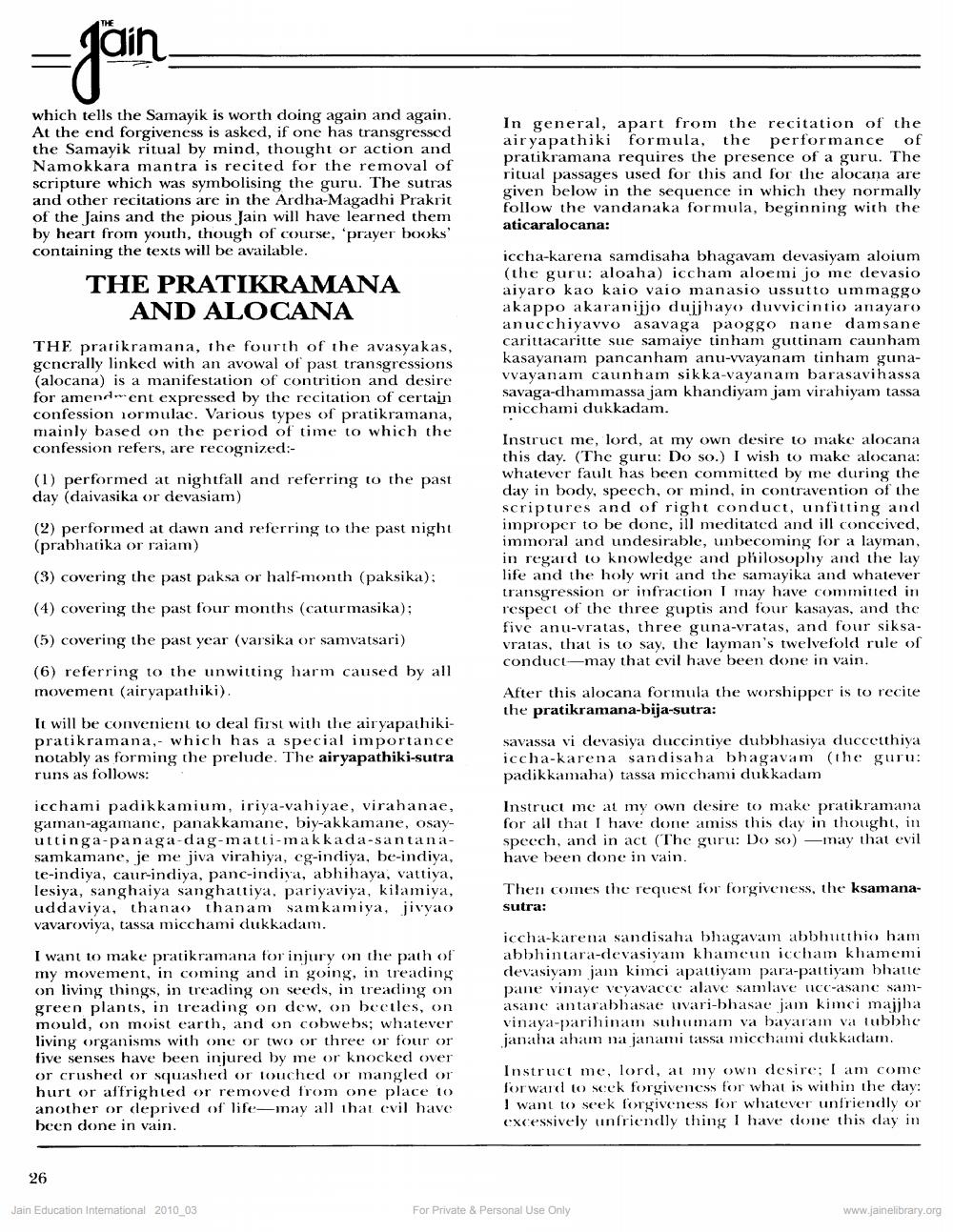________________
which tells the Samayik is worth doing again and again. At the end forgiveness is asked, if one has transgressed the Samayik ritual by mind, thought or action and Namokkara mantra is recited for the removal of scripture which was symbolising the guru. The sutras and other recitations are in the Ardha-Magadhi Prakrit of the Jains and the pious Jain will have learned them by heart from youth, though of course, 'prayer books' containing the texts will be available.
In general, apart from the recitation of the airyapathiki formula, the performance of pratikramana requires the presence of a guru. The ritual passages used for this and for the alocana are given below in the sequence in which they normally follow the vandanaka formula, beginning with the aticaralocana:
THE PRATIKRAMANA
AND ALOCANA
iccha-karena samdisaha bhagavam devasiyam aloium (the guru: aloaha) iccham aloemi jo me devasio aiyaro kao kaio vaio manasio ussutto ummaggo akappo akaranijjo dujjhayo duvvicintio anayaro anucchiyavvo asavaga paoggo nane dam sane caritacaritte sue samaiye tinham guttinam caunham kasayanam pancanham anu-vvayanam tinham gunavvayanam caunham sikka-vayanam barasavihassa savaga-dhammassa jam khandiyam jam virahiyam tassa micchami dukkadam.
THE pratikramana, the fourth of the avasyakas, gcncrally linked with an avowal of past transgressions (alocana) is a manifestation of contrition and desire for amendment expressed by the recitation of certain confession vormulac. Various types of pratikramana, mainly based on the period of time to which the confession refers, are recognized:
(1) performed at nightfall and referring to the past day (daivasika or devasiam)
(2) performed at dawn and referring to the past night (prabhatika or raiam)
Instruct me, lord, at my own desire to make alocana this day. (The guru: Do so.) I wish to make alocana: whatever fault has been committed by me during the day in body, speech, or mind, in contravention of the scriptures and of right conduct, unfitting and improper to be done, ill meditated and ill conceived, immoral and undesirable, unbecoming for a layman, in regard to knowledge and philosophy and the lay life and the holy writ and the samayika and whatever transgression or infraction I may have committed in respect of the three guptis and four kasayas, and the five anu-vratas, three guna-vratas, and four siksavratas, that is to say, the layman's twelvefold rule of conduct-may that evil have been done in vain.
(3) covering the past paksa or half-month (paksika):
(4) covering the past four months (catur masika);
(5) covering the past year (varsika or samvatsari)
(6) referring to the unwitting harm caused by all movement (airyapathiki).
After this alocana formula the worshipper is to recite the pratikramana-bija-sutra:
It will be convenient to deal first with the airyapathikipratikramana,- which has a special importance notably as forming the prelude. The airyapathiki-sutra runs as follows:
savassa vi devasiya duccintiye dubbhasiya duccetthiya iccha-karena sandisaha bhagavam (the guru: padikkamaha) tassa micchami dukkadam
Instruct me at my own desire to make pratikramana for all that I have done amiss this day in thought, in specch, and in act (The guru: Do so) —may that evil have been done in vain.
icchami padikkamium, iriya-vahiyae, virahanae, gaman-agamane, panakkamane, biy-akkamane, osayuttinga-panaga-dag-matti-makkada-santanasamkamane, je me jiva virahiya, cg-indiya, be-indiya, te-indiya, caur-indiya, panc-indiya, abhihaya, vattiya, lesiya, sanghaiya sanghaliya, pariyaviya, kilamiya, uddaviya, thanao thanam samkamiya, jivyao vavaroviya, tassa micchami dukkadam.
Then comes the request for forgiveness, the ksamanasutra:
I want to make pratikramana for injury on the path of my movement, in coming and in going, in treading on living things, in treading on seeds, in treading on green plants, in treading on dew, on beetles, on mould, on moist earth, and on cobwebs; whatever living organisms with one or two or three or four or five senses have been injured by me or knocked over or crushed or squashed or touched or mangled or hurt or affrighted or removed from one place to another or deprived of life—may all that evil have been done in vain.
iccha-karena sandisaha bhagavam abbhutthio ham abbhintara-devasivam khamcun iccham khamemi devasiyam jam kimci apattiyam para-pattiyam bhatte pane vinaye veyavacce alave samlave ucc-asane samasane antarabhasae uvari-bhasae jam kimci majjba vinaya-parihinam suhumam va bavaram va lubbhe janaha aham na janami tassa micchami cukkadam.
Instruct me, lord, at my own desire; I am come forward to seek forgiveness for what is within the clay: I want to seek forgiveness for whatever unfriendly or excessively unfriendly thing I have done this day in
26
Jain Education Interational 2010_03
For Private & Personal Use Only
www.jainelibrary.org




